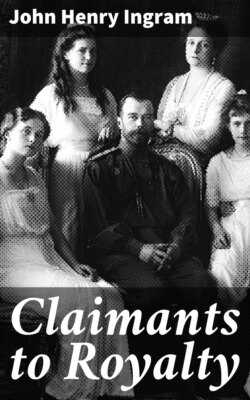Читать книгу Claimants to Royalty - John Henry Ingram - Страница 22
На сайте Литреса книга снята с продажи.
A.D. 800.
ОглавлениеTo many casual readers it may seem a singular circumstance that nearly every claimant to regal paternity has found authors, more or less numerous, to espouse his cause, and assert his identity with the monarch whose name he laid claim to. On inspection the singularity vanishes. Putting on one side the difficulties of investigation which ancient annalists had to encounter, and as a rule the defective evidence they had to judge by, the undeniable fact is arrived at that not a few of the so-called historians often wilfully misrepresented, falsified, omitted, and even invented facts to suit their own party views.
Many of these forgeries the acumen and research of later ages have exposed; many more will doubtless, in course of time, be discovered, but a still larger number in all probability linger undetected in the pages of history, and will ever remain so. It is unfortunate that the class of men to whom we are compelled to resort chiefly for historic and social information prior to the invention of printing, are the very men whose writings it is necessary to hold in greatest doubt; and it is, beyond dispute, well ascertained that history which had to filter through a priest's brains, as a rule descended to posterity deeply tinged, to say the best of it, with the hue its author wished it to have in the eyes of the world.
Æneas Sylvius Piccolomini, better known as Pius the Second, amongst his numerous works left a History of Bohemia, and the thirteenth chapter of that history details the events which have caused us to insert amongst the claimants to royalty the name of Suatocopius, leaving the reader to decide for himself as to the credibility of the aspirant's claim to the name and title of the supposed slain monarch.
The Marcomanni, or Moravians, are asserted to have been converted to Christianity about the middle of the ninth century by Methodius and Cyril, two Greek monks. These two men, noted in history for having implanted the Christian faith in Russia, Bulgaria, and the adjacent lands, were brothers, members of an illustrious Thessalonican family, and distinguished for their learning and the purity of their lives. About the year 860 these missionaries are stated to have appeared at the court of Suatocopius, a king whose sway was more or less acknowledged, not only by the Moravians, but also, according to priestly authority, by the Hungarians, Bohemians, Poles, and inhabitants of Black Russia, but who, notwithstanding the extent of his territories and the number of his subjects, was tributary to the Emperor of Germany, as had been his predecessors since the days of Charlemagne.
Converted by the Greek brothers to the Christian religion, Suatocopius is stated for many years to have set a good example to his subjects of all the virtues called royal; but finally, emboldened by the continuous prosperity of a long reign and the representations of his courtiers, he declined paying any more tribute into the imperial exchequer. This refusal at once involved him in warfare with the Emperor Arnulph, and in a battle which ensued the Moravians were defeated, and, so it was universally believed, their monarch slain. The body of Suatocopius could not be discovered, declares our chief authority, but the fact of his death was deemed indisputable, and his son was permitted by his godfather, the victor, to ascend the vacant throne.
Many years elapsed, and Suatocopius was probably forgotten, when some monks brought his son the astounding information that his father, the king, had only just expired, in the distant and mean hermitage whence they came. The tale which they told, and which their hearer placed entire credence in, according to the history of Pope Pius, was to the effect that for several years they had housed and fed a wanderer who one day had besought their hospitality; during the whole time he had lived with them he had cheerfully and patiently endured all the hardships of their rough and indigent life, but finding his end approaching, the unknown had summoned them to his side and said:—
"Until the present moment you have not known who I am. Know then that I am the King of Moravia, who, having lost a battle, took refuge amongst you. I die, after having tasted the joys of reigning and of private life. The royal state is certainly not preferable to the repose of solitude. Here I sleep without fear and without disquietude, enjoying the calm and pleasures of life, tasting fruits and the purest water, which is far more agreeable than the most precious beverages the courts of kings afford. I have spent with you happily the remainder of the life God has granted me, and the time which I passed upon the throne now seems to me to have been a continual death.... When I am dead inter my body in this place, but go, I beg you, and inform my son, if he be still alive, what I have told you."
Soon after this confession the supposed king died; his body was duly interred by his fellow monks, and information of his decease sent to the reigning monarch. He, with all diligence, had the body disinterred and brought to Volgrade, the capital of Moravia, and, notwithstanding the years that had elapsed since the disappearance of Suatocopius, and the length of time the corpse had been buried, recognized the body as his father's, and had it deposited, with all due pomp and ceremony, in the royal sepulchre, to moulder, royal or plebeian, amid the ashes of his predecessors.
